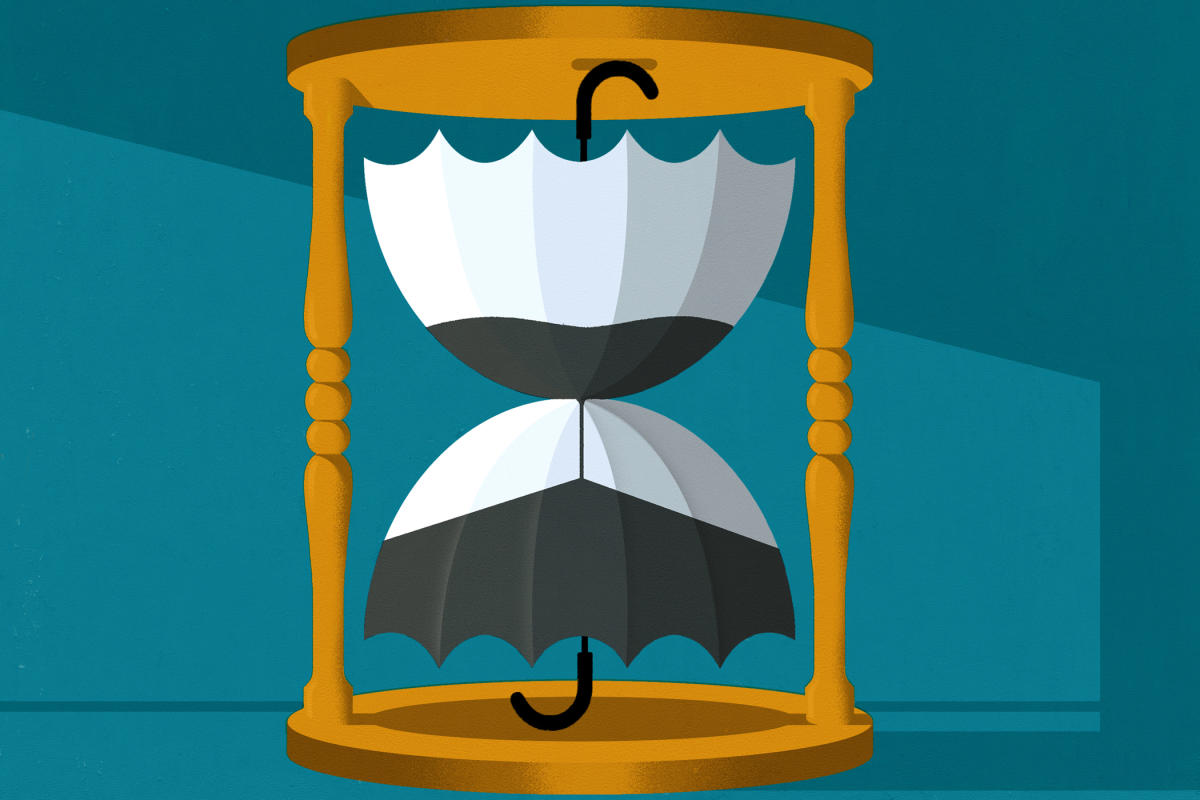Personal Finance
How Long Should Your Life Insurance Policy Last?

Life insurance policies can last for as long as you choose — from five years to your whole life. But, while whole life policies have many benefits, they can also be expensive. Term policies, on the other hand, can offer more affordable coverage for the specific time period you need it the most.
Term length is the amount of time when your policy will be active — in other words, the period of time during which it will pay out a death benefit. Deciding which is best for you will depend on factors such as your age, income, debts and whether you’re a parent or plan to become one.
Read on to learn how to choose the life insurance term that’s right for you.
Table of contents
-
What is a life insurance term length?
-
Types of life insurance term lengths
-
Factors to consider when choosing a life insurance term length
Don’t leave your loved one’s financial future to chance. Get a Life Insurance policy today!
No one knows what the future holds. Make the smart choice today and get life insurance with Ladder. Select your state today to get started!
View Rates
What is a life insurance term length?
A life insurance term is the number of years when your insurance policy is active and will pay out a death benefit to your beneficiaries in the event of your death.
The main benefit of term life insurance is price. Because it will only cover you for a certain amount of time, premiums for a term life insurance policy are much lower than universal life or whole life insurance which remain active for your entire life as long as you pay your premiums.
Unlike permanent life insurance policies, which can have a savings component that grows over time and lets you borrow against the policy’s cash value, term life policies don’t accrue value. However, they do give you the flexibility to renew or purchase a new policy as your life or needs change, for instance, if you become a parent or decide to open your own business. These policies will include conversion periods during which you can convert the term policy to permanent coverage or any other policy without requiring another medical exam.
Types of life insurance term lengths
Most life insurance providers offer a variety of term lengths, which makes it easier to find one that’s right for your financial situation both in terms of cost and payout limit. The most popular life insurance terms available are five, 10, 20 and 30-year terms. The shorter the term, the lower the premium you’ll pay.
Another benefit of these policies is that if your term policy expires and you still need coverage, you can buy another term instead of being tied to a long-term or permanent policy.
Some insurers do offer one-year renewable terms or 40-year terms. However, these are less common. With the annual renewable term your premium payments will increase every time you renew. As for the 40-year term, premiums will be higher given the length of the policy.
Five-year term
When is a 5-year life insurance term recommended?
A five-year life insurance term is best for people who want to cover obligations that will only last a few years. These are debts such as car, home improvement projects or business loans as well as credit card or medical debts.
This shorter-term policy is also a good option for smokers who are in the process of quitting. Life insurance companies consider smokers high-risk individuals, so they charge them higher premiums. A 5-year policy helps people who want to quit meet their insurance needs until they’ve stopped smoking for long enough to get lower rates.
Pros
-
Low premiums
-
Good for temporary needs
-
Coverage without a long commitment
Cons
-
If it expires, the policyholder’s beneficiaries won’t get a payout.
-
Premiums increase when policyholders renew as they age or develop health issues.
-
You may not qualify for renewal if you develop a serious health condition.
-
Renewing the policy multiple times may be more expensive than one long-term policy.
10-year term
When is a 10-year life insurance term recommended?
A 10-year term is a good option for those nearing retirement age that want a death benefit that can replace the income they would earn during the last years of their career.
Young people can also choose a 10-year term when they want to cover financial obligations such as student loans or funeral costs, while having the flexibility to end, renew or convert their policy.
For example, if you’re starting your own business and have a child, a 10-year term offers the benefits of life insurance – a payout your family can use to pay for childcare, education and other expenses – at an affordable rate while you grow your business. Once your business is on more solid footing, you can renew the policy or purchase a longer-term life insurance.
Pros
-
More affordable rates than longer-termed insurance for those in good health
-
Flexibility for those who want a short-term coverage
Cons
-
No cash value unlike universal or whole life insurance policies
-
Renewing or converting can be expensive as you age
-
No savings so you don’t get back what you paid in premium
-
Shorter period to convert your policy into permanent life insurance than longer term policies
20-year term
When is a 20-year life insurance term recommended?
A 20-year term life insurance is one of the most popular because it offers fairly low premiums for an optimal amount of time.
Terms that last 20 years are a great option for families with young children or couples who are in good health, as they’ll lock in a good rate for long-term protection. A 20-year policy will cover your child’s grade-school years and might even cover some college years.
A 20-year term is also a good option if you have large debt such as student loans that your parents cosigned. These debts could pass to your survivors, so having a life insurance policy with enough coverage to pay them off will help you protect your beneficiaries.
Twenty-year policies also give you more time to change your coverage to one that accommodates whatever life changes you’ll experience during the term.
Pros
-
Ideal for those with dependents or large debt
-
Tax-free death benefits for beneficiaries
-
Good option for young people or families with young children
-
Long period to convert your policy into permanent life insurance
Cons
-
Premiums don’t go into savings or an investment account
-
Death benefit may be lower than your needs as your life changes
-
Renewal is expensive as providers take into account your age and overall health
-
Not a good option if you’re in poor health or smoke as your premiums will be high
30-year term
When is a 30-year life insurance term recommended?
A 30-year term life insurance policy is ideal for individuals with long-term financial or family obligations, that is, new parents, people with a mortgage or professionals with substantial college debt.
This term is also a good option for young people who wish to cover a good portion of their working or earning years. However, if you need a larger death benefit during the term you’ll have to renew or purchase another life insurance policy with a higher death benefit than your previous policy. This will, of course, raise your premiums.
Pros
-
Lower premiums than permanent life insurance policies
-
Coverage that spans your children’s school years or that lasts right up to your retirement
-
Riders available that pay a portion of the benefit if you’re diagnosed with certain illnesses
Cons
-
Renewal will be expensive as providers will take into account your age
-
No cash value
-
No flexibility in terms of increasing your death benefit
-
Not a good option if you’re in poor health or smoke as your premiums will be high
Factors to consider when choosing a life insurance term length
There are several factors to consider beyond the death benefit. Key among these are how much life insurance you need to cover your debts and responsibilities, and at what age you plan to purchase your policy.
Age
Age is an important factor because it helps determine the premiums you’ll pay. The younger and healthier you are, the lower your premiums will be. If you’re young, choosing a longer term means you’ll have coverage that will span most of your working years for an affordable price.
Age also helps you determine how long you need to account for as life insurance is there to help replace what you contribute to your family.
Income and debts
Calculating how long it’ll take to pay off your largest debts will help you get an idea of the term length you should choose.
For example, if you have 20 years of mortgage payments left, then you may want to get a 20-year term policy so the death benefit covers whatever’s left of the mortgage. You should also factor any other outstanding debt, as your beneficiaries might inherit some of these.
Children’s age
If you have or are planning to have children, you’ll probably need a term that helps provide for them at least until they turn 18 or are out of college.
You should also consider if your children, or other family members who depend on you, have special needs as they might need financial support into adulthood.
How Long Should Your Life Insurance Policy Last? FAQ
How long should you get life insurance for?
You should get a term long enough to cover your largest financial responsibilities if you die. That is your income and debts for however long you want to cover them so your loved one, dependents or beneficiaries don’t go without the financial support you currently provide. You should also consider the age of your children or other dependents when selecting a life insurance term.
What happens when your life insurance term ends?
Once your life insurance term is over, your coverage ends and your beneficiaries would not get a death benefit. If you want to keep the protection for your entire life you’ll have to renew or extend your policy. Another option is to purchase a permanent life insurance policy that will cover you for a lifetime as long as you pay your premiums. Keep in mind that buying a new policy means going through another underwriting process.
What is the most common term for life insurance?
The most common term for life insurance is 20 years. If you’re young, a 20-year term covers you for the bulk of your career years which may include a mortgage or children. It’s also popular among older individuals who need a new policy once their previous term life insurance has expired.
Summary of Money’s How Long Should Your Life Insurance Policy Last?
Choosing a life insurance term will depend on how long you want coverage to be in place. You might want a term that will last as long as your career so the death benefit replaces an income your family depends on.
The most popular term lengths range from five years to 30, although there are shorter and longer terms available. The term that’s right for you will depend on your current circumstances, how long you want the protection to last and why.
Five or ten year terms work best for short-term needs. Twenty and 30-year terms are great for those people who want long-term protection to cover income, large debts like a 30-year mortgage or provide for young children.
To choose the best life insurance term you must consider factors such as age, income, debts and the age of your dependents as they’ll help you determine the term that will best cover your financial obligations for your family or beneficiaries.
© Copyright 2023 Money Group, LLC. All Rights Reserved.
This article originally appeared on Money.com and may contain affiliate links for which Money receives compensation. Opinions expressed in this article are the author’s alone, not those of a third-party entity, and have not been reviewed, approved, or otherwise endorsed. Offers may be subject to change without notice. For more information, read Money’s full disclaimer.
Read the full article here

-

 Side Hustles5 days ago
Side Hustles5 days agoMicrosoft Is About to Begin Job Cuts. Here’s Why.
-

 Make Money4 days ago
Make Money4 days ago10 Critical Questions to Ask Your Financial Advisor Now
-

 Make Money3 days ago
Make Money3 days ago10 Ways to Make Money As a Graphic Designer
-

 Passive Income6 days ago
Passive Income6 days ago3 Challenges Entrepreneurs Will Face in 2025
-

 Investing5 days ago
Investing5 days agoWhat CMOs Need to Know About AI Adoption in Marketing Teams
-

 Side Hustles6 days ago
Side Hustles6 days agoThe Canadian Media Lawsuit That Could Reshape Tech’s Future
-

 Personal Finance2 days ago
Personal Finance2 days agoIf you are 60 years old, new 401(k) rules could save you money
-

 Side Hustles5 days ago
Side Hustles5 days agoJPMorgan to Implement a Five-Day Return-to-Office Mandate


















